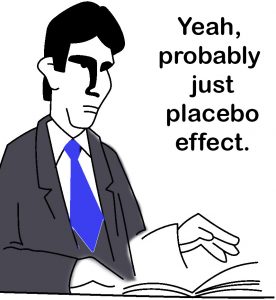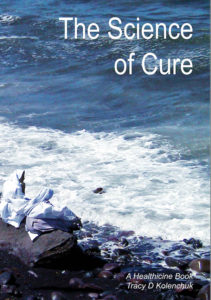 What is the true cause of a placebo effects? Webster’s dictionary provides a not-cause, but no cause: “improvement in the condition of a patient that occurs in response to treatment but cannot be considered due to the specific treatment used“.
What is the true cause of a placebo effects? Webster’s dictionary provides a not-cause, but no cause: “improvement in the condition of a patient that occurs in response to treatment but cannot be considered due to the specific treatment used“.
Oxford’s dictionary offers a similar definition, but suggests a cause “A beneficial effect produced by a placebo drug or treatment, which cannot be attributed to the properties of the placebo itself and must therefore be due to the patient’s belief in that treatment“.
Is Oxford’s dictionary right? Are the patient’s beliefs the ‘true cause’ of a placebo effect? Let’s look at the logic. First, what is NOT the cause of a placebo effect?
Dictionaries agree, Webseter: “cannot be considered due to the specific treatment used“, Oxford: “cannot be attributed to the properties of the placebo itself“.
A placebo effect is NOT caused by a placebo. If the patient is given a placebo, and the patient experiences “a beneficial effect”, the effect was NOT caused by a placebo, it was caused by “something else”. If it is “placebo effect“, then, by definition, it was not caused by the treatment, not caused by the placebo. It was caused by “something else”. We need to remember this when someone says “It’s probably just placebo effect“.
It sounds a bit ridiculous, doesn’t it. It is ridiculous. We know there was an improvement in the patient’s condition, but we are only talking about what DID NOT CAUSE the improvement, paying no attention to what DID CAUSE the improvement.
What then, is the actual cause of a placebo effect? Both definitions give a clue in their certainty, or lack of certainty.
Webster’s: “cannot be considered” and Oxford’s: “cannot be attributed to” are exactly the same phrases. We can translate these into a simple English statement:
A placebo effect is a positive effect that we believe was not caused by the treatment.
Belief
They key to understanding placebo effect is to understand who “believes“. There are several situations where a placebo effect might be identified:
- A doctor prescribes a medicine that the doctor does not believe will have any beneficial effect on the illness, but believes it will have provide a benefit to the patient. A placebo effect. Something else caused the benefit.
- A clinical study administers a pill that the researchers do not believe will have any beneficial effect on the illness. All subsequent benefits are considered to be “not caused by the placebo”, because they are “placebo effects”. Something else caused the benefit.
- A person or doctor claims a benefit from a treatment or medicine but the critic (a doctor, researcher, or other person) does not believe the treatment provided the positive effect. Something else caused the benefit.
If the doctor, or the researcher, or the critic DOES NOT BELIEVE, the improvement in the patient’s condition was caused by the treatment, something else caused the benefit. Why don’t we investigate ‘something else’? Why do we simply label it ‘placebo effect’ instead?
Oxford claims that a placebo effect “must therefore be due to the patient’s belief in that treatment“. Can anyone prove an effect is “due to the patient’s belief in the treatment“? No. And nobody cares what the patient believes.
There is another problem with this hypothetical cause. If a treatment deliberately manipulates the patient’s belief in the treatment, then the positive effect WAS caused by the treatment, therefore – it’s not a placebo effect.
The truth about placebo effects? The concept of a placebo effect is a paradox, self contradictory. It is not possible for a placebo to cause a placebo effect, by definition. It is not possible for placebo effects to be “caused by the patient’s belief in the treatment“, because if so, it’ s not a placebo effect, it’s a real effect.
Why then is the phrase “placebo effect” so commonplace so popular? Why do placebo effects seem to be everywhere in medicine?
Placebo effects are an excuse. And a lame one. An excuse to ignore the effect, to ignore the cause. Deliberate ignoring. Deliberate ignorance. When someone claims that a positive effect was a placebo effect, they can excuse themselves from any responsibility to study, to understand, to find the true cause, and make effective use of the effect.
When placebo effects are identified and measured in clinical studies, they automatically moved to the “we don’t study these” column. Placebo effects don’t count. Effects that don’t count, are labelled ‘placebo effects’, so we don’t have to understand them.
Placebo Ignoring, Placebo Ignorance
Placebo effects are caused by intentional ignoring, by ignoring important benefits.
Placebo effects are a result of calculated, deliberate ignorance of real positive effects. If a research study enrolls 50 patients in a clinical study of a drug, and the drug provides an improvement to 15 patients, while “placebo effect” provides a benefit to 11 patients, the researchers take the 15 patients and their experience as “evidence”. They deliberately discard information about the 11 patients who received “placebo benefits”. These 11 patients benefited from something, the researchers don’t know what provided the benefit. And they don’t care. If 15 patients on the placebo experienced benefits, and only 11 on the drug experienced benefits – the study is a failure, the results are financially useless and they are thrown away, not published.
Can Placebo Effects Cure?
Maybe you haven’t noticed, placebo effects don’t cure. It seems obvious that placebos can’t cure, but remember – placebo effects are not caused by placebos. Placebo effects are real positive effects, with real causes, where researchers deliberately ignore the cause.
What if a placebo cures? Is it a placebo effect? Are there any research studies where a placebo actually CURED the patient? Yes. There are. But, those are in the past, here’s one. Today, placebos can no longer “cure” any disease, by lack of definition of cure.
Today’s clinical studies do not count cures. It’s hard to ignore a placebo, if the patient is cured. The solution? Don’t count cures. Most of today’s clinical studies – all clinical studies of diseases “not caused by a parasite” deliberately ignore cures, by omission, because cured is not defined.
Clinical studies of treatments for cancer, heart disease, arthritis, dementia, even obesity and depression do not contain a definition of “cured”. Clinical studies for these, and many other diseases, cannot document a cure found, because CURED cannot be tested, because cured is not defined in the parameters of the study.
These clinical studies measure “benefits provided by the treatment” up to, but not including cures. Cured is beyond the testing limits of most clinical research.
So placebos cannot cure. Most medicines can longer cure. Cure, cures, curing, and cured are not defined in any authoritative medical reference text. Cure, cures, curing and cured are disappearing from medical theory and practice.
When will we begin to understand placebo effects? When we study them. Every so called “placebo effect” is a real effect, with a real cause. The cause might be the belief of the patient. It might be something else. Once we understand the cause, it’s no longer a placebo effect, it’s a real effect, with a real cause.
When will we find cures?
When we have defined CURED for every disease, such that it can be tested independent of the treatment administered. Until then, we’ll search for medicines that don’t cure, and ignore benefits we can’t explain, calling them “placebo effects”.
to your health, tracy
Founder: Healthicine


